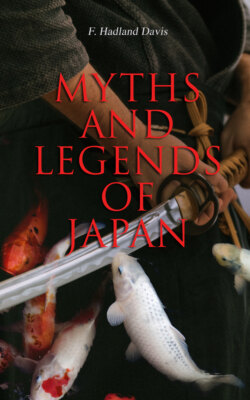Читать книгу Myths & Legends of Japan - F. Hadland Davis - Страница 41
На сайте Литреса книга снята с продажи.
The Legend of the Golden Lotus
ОглавлениеThe following legend is obviously not of Japanese origin. The priests of Buddhism in Japan knew that the success of their religion lay, not in sweeping out the old gods of Shintō, but in adapting them with infinite cleverness to the needs of their own teaching. In this case Japan has borrowed from India and in a minor degree from China, if we may look upon the dragon as originally belonging to the Celestial Kingdom. We have followed closely Mr. Edward Greey's version, and insert it here because it often enters into a Nippon priest's discourse, and has a decidedly Japanese setting. We might duplicate legends of this kind, but one will be sufficient for our purpose. The other two legends given in this chapter are strictly Japanese.
The Lord Buddha, having concluded his holy meditations upon Mount Dan-doku, slowly walked along a rocky pathway on his way to the city. The dark shadows of night crept over the country, and there was profound stillness everywhere.
On nearing his destination the Lord Buddha heard some one shout: "Shio-giyo mu-jiyo!" ("The outward manner is not always an index to the natural disposition.")
The Lord Buddha was delighted at these words, and desired to learn who had spoken so wisely. Over and over again he heard the same words, and, drawing to the edge of a precipice, he looked down into the valley beneath, and perceived an extremely ugly dragon gazing up at him with angry eyes.
Buddha and the Dragon.
The Holy One then seated himself upon a rock, and inquired of the dragon how he had come to learn one of the highest mysteries of Buddhism. Such profound wisdom suggested a store of spiritual truths yet to be revealed, and the Lord Buddha, therefore, requested that the dragon should give utterance to other wise sayings.
Then the dragon, having coiled himself round the rock, shouted with a great voice: "Ze-shio metsu-po!" ("All living things are antagonistic to the law of Buddha!")
After uttering these words the dragon was silent for some time. Then the Lord Buddha begged to hear yet another sentence.
"Shio-metsu metsu-i!" ("All living things must die!") shouted the dragon.
At these words the dragon looked up at the Lord Buddha, and upon his dreadful countenance there was an expression of extreme hunger.
The dragon then informed the Lord Buddha that the next truth was the last, and so precious that he could not reveal it until his hunger had been appeased.
At this the Holy One remarked that he would deny the dragon nothing so long as he heard the fourth truth revealed, and inquired of the dragon what he demanded. When the Lord Buddha heard that human flesh was what the dragon required in exchange for his last precious fragment of wisdom, the Master informed the dragon that his religion forbade the destruction of life, but that he would, for the welfare of his people, sacrifice his own body.
The dragon opened his great mouth and said: "Jaku-metsu I-raku!" ("The greatest happiness is experienced after the soul has left the body!")
The Lord Buddha bowed, and then sprang into the gaping mouth of the dragon.
No sooner had the Holy One touched the jaws of the monster than they suddenly divided into eight parts, and in a moment changed into the eight petals of the Golden Lotus.
